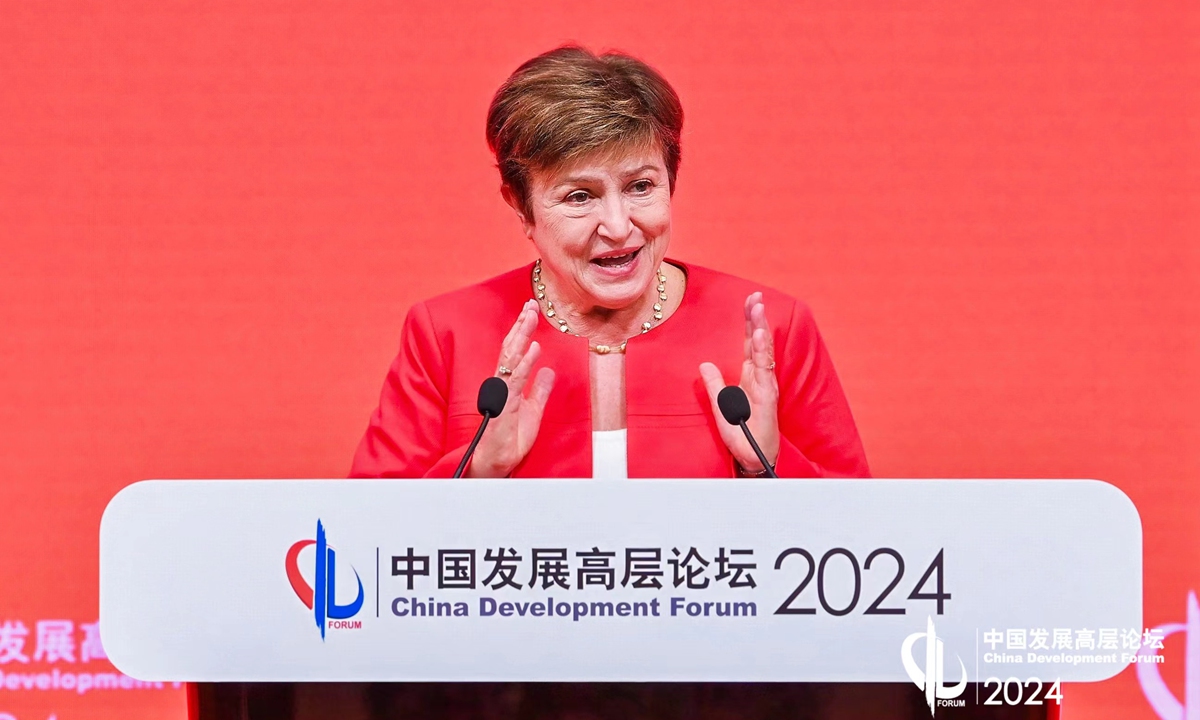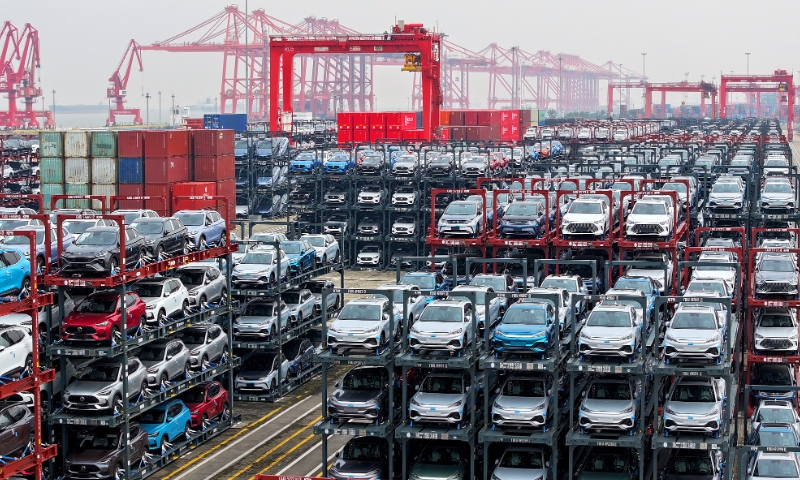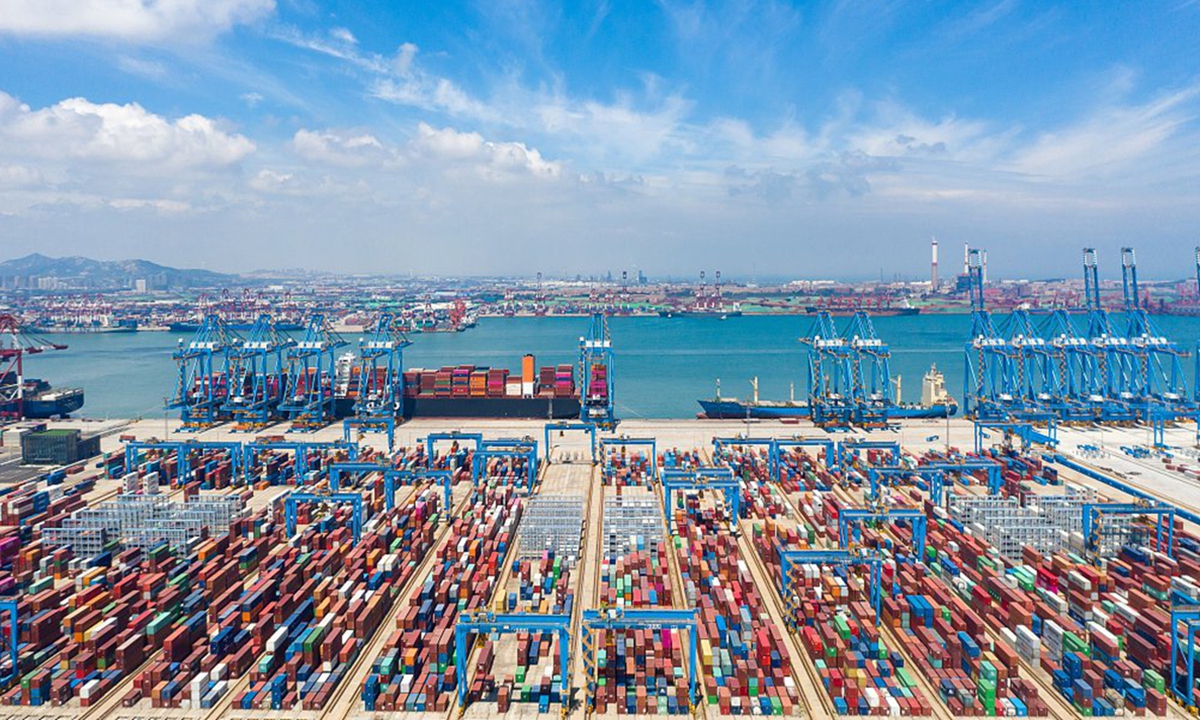Digital economy, green economy new impetus for China's economy: veteran Japanese economist

A concept photo of digital economy Photo: VCG
Editor's note: The Chinese government work report submitted on March 5 to the national legislature set an "around 5 percent" GDP growth target for 2024, and China's pursuit of new quality productive forces has become a major focus at the two sessions in early March. Global Times reporters Chen Qingqing and Bai Yunyi (GT) spoke to veteran economist Tatsuhito Tokuchi (Tokuchi), executive board member and research fellow at Center for Industrial Development and Environmental Governance of Tsinghua University and former chairman of CITIC Securities International Co Ltd, to discuss the challenges and opportunities facing China's economy.

Tatsuhito Tokuchi Photo: Courtesy of Tatsuhito Tokuchi
GT: In the Government Work Report, the Chinese government set this year's economic growth target at "about 5 percent." What's your take on the target?
Tokuchi: I believe the Chinese government has considered various aspects of the economy and decided on the 5-percent growth target, which should be within a reasonable range. However, reaching this target is not without difficulties, such as the downturn in the real estate market, high levels of debt among local governments, and the impact of complex geopolitical factors, all of which should not be underestimated. This year may become a crucial one for returning to normalcy post-pandemic.
In my view, rather than pursuing economic growth rates, the most urgent job for China is to prevent deflation.
In my memory, China experienced deflation twice after the reform and opening-up, the most recent one being in 2015, which rebounded quickly. An earlier instance was during the Asian Financial Crisis in 1997, when almost all economies in Asia were impacted and adopted policies to devalue their currencies to promote exports. However, China decisively chose not to devalue the yuan but to expand domestic demand instead, preventing the financial crisis from worsening further. Despite the government's proactive fiscal policy, the decision not to devalue the Chinese yuan had a significant impact on exports, and the domestic market experienced severe deflation.
Personally, I think the current situation may be more serious than the years following the Asian Financial Crisis, due to fundamental changes in both domestic and international conditions surrounding the Chinese economy.
Fields like foreign trade, high-speed railways, highways, and real estate, which had previously seen explosive growth and absorbed a large number of employment opportunities, are no longer the "one-size-fits-all" development areas. Emerging industries such as artificial intelligence (AI) and digital economy, green and environmental economy, and smart modern urban construction have different characteristics from previous industries. They embody what the famous economist Joseph Schumpeter described as "creative destruction", meaning their emergence will disruptively change and impact previous industries. On one hand, the government needs to actively develop these emerging industries, and on the other hand, it must address the pressing issues of real estate, the stock market, and the local debts.
GT: Some views suggest that the current performance of the Chinese economy resembles that of Japan in the 1990s. What do you think of this comparison? What lessons can China learn from Japan's experience?
Tokuchi: The "lost three decades" of Japan teach us many lessons, but I believe the greatest lesson is how to escape deflation. The general backdrop of Japan's lost decades was the collapse of assets on the balance sheet, namely real estate and the stock market, which necessitated individuals and businesses to cut spending to repay debts, and banks became very conservative due to bad debts.
This led to a decrease in consumption, which in turn drove down the prices of goods and services, leading to deflation. Once deflation occurs, people expect that "buying things next year is better than this year, because prices will be lower"; businesses would expect that "increasing production would only hasten the decline in prices and profits, so it's better to produce less and cut costs, including labor costs." This would cause the entire economy to contract - a phenomenon Nomura Research Institute's Richard C. Koo called "balance sheet recession."
In a balance sheet recession, only the state can counter the market by increasing investment; the central bank can reduce interest rates and ease credit, lessening the financial burden on businesses and citizens. The tragedy of Japan was that the government's actions were too slow, too small, and not decisive, resulting in a prolonged period that became very costly and greatly demoralized the nation, especially the youth.
Today, China and Japan of that era share a common problem stemming from the asset side: China's real estate-related industries account for about 30 percent of China's economy, and real estate prices have been inflated. Moreover, with 80 percent of Chinese households already owning their first home and the impact of a declining birth rate, the number of families in the age group to buy their first home is decreasing every year. Therefore, except for the demand for affordable housing, it can be said that China's real estate market has reached a significant turning point.
Another similarity is the geopolitical environment. The collapse of the Soviet Union in the 1990s made the US feel the "end of history," thinking it had become the only "world leader," but economically, Japan was surpassing the US in many dimensions. This compelled the US to suppress Japanese industries to maintain its hegemonic status. Examples include trade frictions in car and semiconductor. Today's China-US relations also bear some similarities to the Japan-US relations of that time.
Of course, there are also differences between China and Japan, such as different stages of development. China's urbanization rate is still over 60 percent, while Japan's was over 90 percent at that time. Additionally, Japan's GDP per capita had surpassed $25,000, making it a relatively mature developed country. These differences have both advantages and disadvantages for China. The advantage is that there is still room for development; the disadvantage is that if China cannot overcome the current challenges, it might fall into the trap of "growing old before becoming wealthy."
GT: In light of these issues, what is your advice for China's economic policymakers?
Tokuchi: First and foremost, the issue of deflation needs to be addressed, and a full understanding of the dangers of deflation is essential. To tackle deflation, solving the real estate issue is key. However, there is no "one-size-fits-all" solution; only a comprehensive approach can overcome the problem. At the same time, be mentally prepared for a considerably long battle.
Since last year, the Chinese government has been lowering interest rates, which has supported asset prices to some extent; the government's announcement during the two sessions to adopt active and new fiscal measures is also a positive signal. Besides monetary and fiscal policies, I believe it's necessary to continue introducing various policies that suit local conditions. Moreover, China needs to find new points of economic growth.
The most promising areas are undoubtedly the digital and green economies. An article published last year by the renowned American financial investment group KKR mentioned that if the negative drag of real estate were removed, China's economic growth rate in 2022 could actually reach 6.7 percent. Within this, the digital economy contributed 3.1 percent to China's growth, while the green economy contributed 1.6 percent.
I think one critical aspect is how to perceive and explain the risks to the public. I believe the decision-makers in China's economic departments are clear about the challenges. The relevant departments could do well to explain the current difficulties, issues, and measures to be taken more clearly to the public. This would not only help to reassure the people but also stabilize external expectations of China's economic development.
GT: China is seeking new drivers for its economic growth and recently introduced the concept of "new quality productive forces." What do you think are the potential new drivers for China's growth?
Tokuchi: Starting from the end of last year, the international demand for semiconductor chips has bottomed out and is on the rise, with the semiconductor industry potentially entering a three to five-year upward cycle.
A major reason behind this is the explosive development of the AI market last year, represented by ChatGPT, which boosted the demand for new chips, devices, and technologies. China is the world's largest big data society, coupled with having the world's largest manufacturing base. The Chinese government has long recognized the importance of the digital economy to social development and has adopted proactive industrial policies to support the growth of the digital economy. Although currently facing constraints from geopolitical factors, preventing the import of the most advanced chips, devices, and technologies from overseas, overall, China still has tremendous potential for development in the AI field.
In the green economy, in almost all related industries such as electric vehicles, batteries, solar energy, and wind energy, China is now among the world's leaders. This development momentum plays a significant role in driving the economy.
Additionally, an important "growth point" is allowing more people to share in the "dividends" of China becoming a middle-to-high income country.
For example, providing affordable housing for people moving from rural areas to cities, offering them better medical care and improving their pension levels. These measures may seem like a financial "burden" on the surface, but if people's lives are stabilized and they have stable expectations for the future, it will help boost consumption, reduce social stratification, and positively impact economic development. Furthermore, the tertiary sector, including education, tourism, and entertainment, can stimulate consumption and become new growth points.
In summary, when we look at China's economic prospects, we need to recognize the serious challenges that exist but need not be overly pessimistic.
GT: In recent years, some Chinese companies have ventured into Southeast Asia, Mexico and other regions, building up factories and supply chains there. This seems reminiscent of Japan in the past century. What is your take on this?
Tokuchi: First of all, this is not a bad thing; for companies, it is a necessary action for survival and development. It is unfair to criticize "outbound companies" without understanding the context.
Taking Japan's situation as an example, Japan's domestic market was experiencing deflation, and companies had to go overseas to survive and grow, while the appreciation of the yen further motivated them to invest abroad. We see now that well-developed Japanese companies like Toyota and Panasonic, which invested in the US, China, and Southeast Asia, have spread their supply chains worldwide as a result. Had they remained locked within Japan, they could only struggle or wait to die. Japan is currently the country with the most overseas assets, with overseas investment by Japanese companies accounting for 15 percent of their total assets, creating substantial foreign exchange income every year and maintaining their competitiveness.
As China's domestic market matures, it is a very natural and reasonable choice for Chinese companies to set up factories in Southeast Asia, Europe, and the Americas. It can replace export pressure and improve competitiveness through domestic and overseas complementarity. Of course, some worry about what will happen to China's domestic economy as many factories invest overseas. This requires implementing various measures to boost domestic consumption. China still has a savings rate of up to 40 percent, with bank deposits amounting to 130 trillion yuan. This means there is still significant room for investment and consumption in China. Both consumption and investment require joint efforts from the private sector and the government.
Lastly, I want to emphasize the significant role of private enterprises. Firstly, private enterprises are more sensitive to market and public needs; they are also a central force in China's innovation while absorbing 80 percent of the employment. Therefore, any policies adopted by the government related to private enterprises must be positive and proactive.




